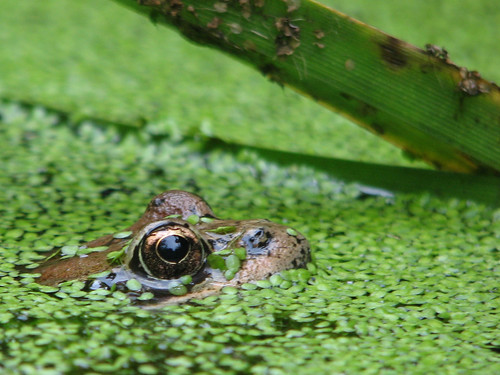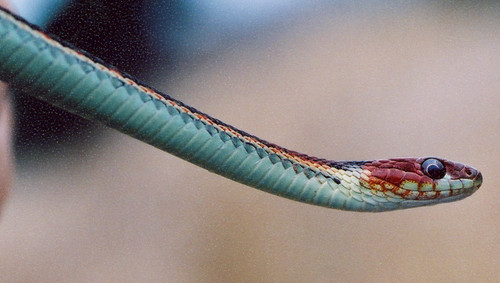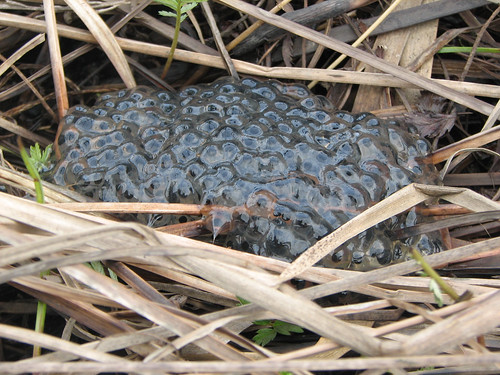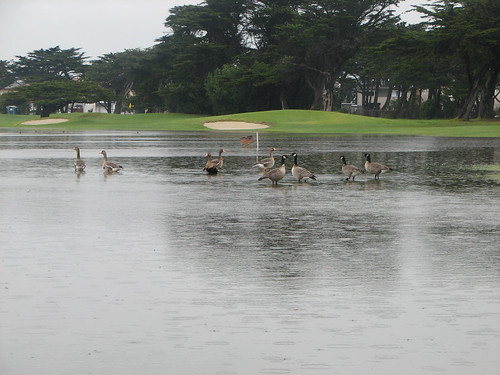
California red-legged frog. Photo: Wild Equity Institute
Environmental groups have filed suit against the city of San Francisco under claims it’s violating the Endangered Species Act at Sharp Park Golf Course.
The groups say that San Francisco, which owns and operates the 90-year old golf course in nearby Pacifica, is harming two imperiled native species: the California red-legged frog and the San Francisco garter snake.
They claim that lawn-mowing, pesticide and herbicide spraying, and flood control activities on the course are contributing to population losses and that the city has done little to mitigate the ill-effects of golfing on the species’ habitats.
“The course was built on wetlands and was never sustainable with species protection,” said Neal Desai of the National Parks Conservation Association, one of the groups party to the lawsuit. “The city is putting at risk the recovery of wildlife.”
The suit was filed on Wednesday in the U.S. District Court of Northern California in San Francisco by the Wild Equity Institute, the Center for Biological Diversity, the National Parks Conservation Association, the Surfrider Foundation, Sequoia Audubon, and Sierra Club.
San Francisco’s Recreation and Park Department Spokesman Elton Pon declined to comment on the case, saying the department has not yet reviewed it.

San Francisco garter snake. Photo: Sue Gardner.
Environmentalists have battled with the city for years over the future of Sharp Park Golf Course. While the city is intent to maintain the 18-hole course, environmentalists have been pushing for it to be shut down and turned into restored wildlife habitat with low-impact recreational uses like hiking and biking.
Meanwhile, another interest group — golfers — prize the course as one of the only coastal ranges in the state that is open to the general public, making it cheaper than the likes of Pebble Beach.
Last week the city’s park department announced that a working group had come up with a “vision for Sharp Park” that “could balance ecological and recreational objectives” by tripling the amount of habitat available to the two species through restoration efforts.
Species in peril
The golf course is prime territory for the California red-legged frog and San Francisco garter snake – two species that have experienced significant population declines as development has taken hold of much of the region.
The red-legged frog has been lost from more than 70 percent of its historic range and is listed as a threatened species by the U.S. Fish and Wildlife Service. The San Francisco garter snake has 1,000 to 2,000 individuals left and is listed as an endangered species. Only six significant snake populations are known to exist, one of which is at Sharp Park, according to the lawsuit.
Environmental groups say they are particularly concerned by a wintertime pumping system at Sharp Park, meant to divert rainwater to the ocean in order to keep the course clear of flooding. In the process, they say they’ve documented numerous cases, the latest on February 22, in which frog egg masses have been stranded and dried out because of the pumping.

Environmentalists say these red-legged frog eggs were exposed to die on Feb. 23 due to Sharp Park water pumping. Photo: Wild Equity Institute
They also documented a case in which a garter snake was found dead after being struck by a lawn mower. Golf carts on pathways are also a problem for the snakes, who use them for basking, the lawsuit states.
In 2005, the controversy drew the attention of the U.S. Fish and Wildlife Service, which sent a letter to the golf course’s program manager stating that water pumping in previous years had exposed red-legged frog eggs, resulting in “the death of an unknown quantity of embryonic tadpoles.” The agency warned that it’s illegal to harm any federally listed animal species without a permit. The city responded in a letter saying it has been monitoring the egg masses and had reset the pumps to allow the water level to remain over the eggs until they hatch. But the city also blamed flooding at Sharp Park to water drainage from surrounding lands, including adjacent federal park land managed by the Golden Gate National Recreation Area.
Since then, environmentalists and park officials have been at odds over whether the golf course could ever exist in harmony with the beleaguered species. The city’s most recent plans for the park, stated in last week’s press release, included removing sediments from wetland habitat and forming a water channel that would connect to Mori Point, which is federally protected parkland adjacent to the course. The city would move the 12th hole to make way for the water channel, and abandon plans to fortify a sea-wall that environmental groups opposed because of beach erosion.

Flooding at Sharp Park Golf Course. Photo: Wild Equity Institute.
“Our priorities have been to meet the ecological requirements of the species and to maintain golfing as a valued recreational pastime at Sharp Park,” said Phil Ginsburg, general manager of the San Francisco Recreation and Park Department, in a statement. “We also accept the consensus which is forming to naturally manage the coastal areas at Sharp Park over the long term.”
But Desai said the city’s efforts are inadequate. Golfing and species protection — in this case — cannot go hand in hand, he said.
“They feel that moving one hole and realigning it consists of species protection,” Desai said. “That’s like treating a species like it’s in the zoo.”
Enviro groups sue San Francisco over Sharp Park Golf Course | Way Out West News.
![]()




